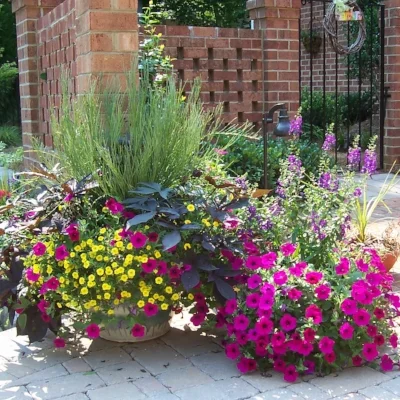Winter Houseplant Care

A little extra TLC can keep your houseplants happy and healthy through the winter. Watch out for these common winter houseplant woes:
Lower light levels. The days are shorter and the sun much less intense. Remember to turn your plants regularly so they don’t start to lean towards what little light that they can find. Once a week, rotate your houseplants 180 degrees.
Low humidity. The more your heater runs, the drier you home’s air gets-as low as 15% humidity. That’s drier air than in the Sahara! This forces your houseplants to lose moisture through their leaves, and this loss can sometimes be greater than what they can absorb through their roots. This can result in chronic wilting or even dried, brown leaf edges. There are a few things you can do to counteract this:
Group your houseplants together so they create an area of higher humidity. Each plant’s lost water actually helps the neighboring plants.
Create a pebble tray by filling a low, waterproof container with gravel (large saucers work great for this) and adding water to just below the surface of the gravel. Place plants on top of the gravel.
Lightly mist the leaves of your houseplants. The leaves shouldn't look wet after you’you've finished.
Use a humidifier in your home. This will make you more comfortable also, and can keep wood furniture from developing cracks too.
Pest infestations. Often a few unnoticed pests will explode into a full-on infestation. Spider mites in particular thrive in the low humidity of the winter home, but mealybug and aphids can also cause problems. Check your plants carefully at least once a month, observing new growth (a favorite of aphids), the undersides of leaves (spider mite havens) and the areas where leaves meet stems (mealybugs often hang out here). If you find any pests treat immediately to avoid a bigger problem.
Too much fertilizer. The low humidity in winter often means the soil gets quite dry, especially on older plants. Excess fertilizer left behind in dry soil can damage plant roots. Additionally, most houseplants are nearly dormant in winter, putting out little or no new growth. With no growth to “use up” fertilizer, the excess can accumulate in the plant leaves, causing burning. If you use organic fertilizers, these issues are less of a concern, but you’re still wasting money if you feed at the same rate as you do in summer. Reduce fertilizing to ½ or less of the amount you used in summer-just enough to keep leaves nice and green. Pick back up in spring when you see new growth again.

Here are the common ways your landscape is telling you it needs help.
Controlling fall and winter weeds is a constant battle. Here are some of the reasons control can be difficult.
New Garden Landscaping & Nursery feels that Boxwood Blight could have a major impact on landscapes containing boxwood in the near future. Here’s what you need to know about the disease.
Since fall is the time to plant spring blooming bulbs, here are the answers to some common questions about bulbs.
Don't panic, there are a few common (and benign) reasons that trees drop leaves in summer.
Ugh! What’s nastier than a sack of crawly caterpillars hanging from your trees? How about a dozen of ‘em?
Quick tips for avoiding the fungal disease Brown Patch in lawns
Blueberries make great container plants! Watch this video from our friends at Espoma for tips and see how easy it is to grow blueberries in containers.
Good container plantings require little maintenance aside from watering and can enhance your home through the spring, summer, and fall.
Unlike some other flowering plants, crapes will develop their flower buds on new growth.
This is a question we have been asked frequently this fall.
Where and why this is not bad advice, and where it’s a terrible idea.
Plant some of these low-maintenance (and critter resistant) spring bloomers this fall.



















